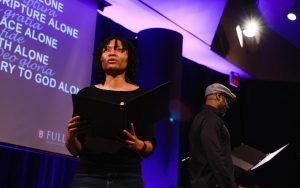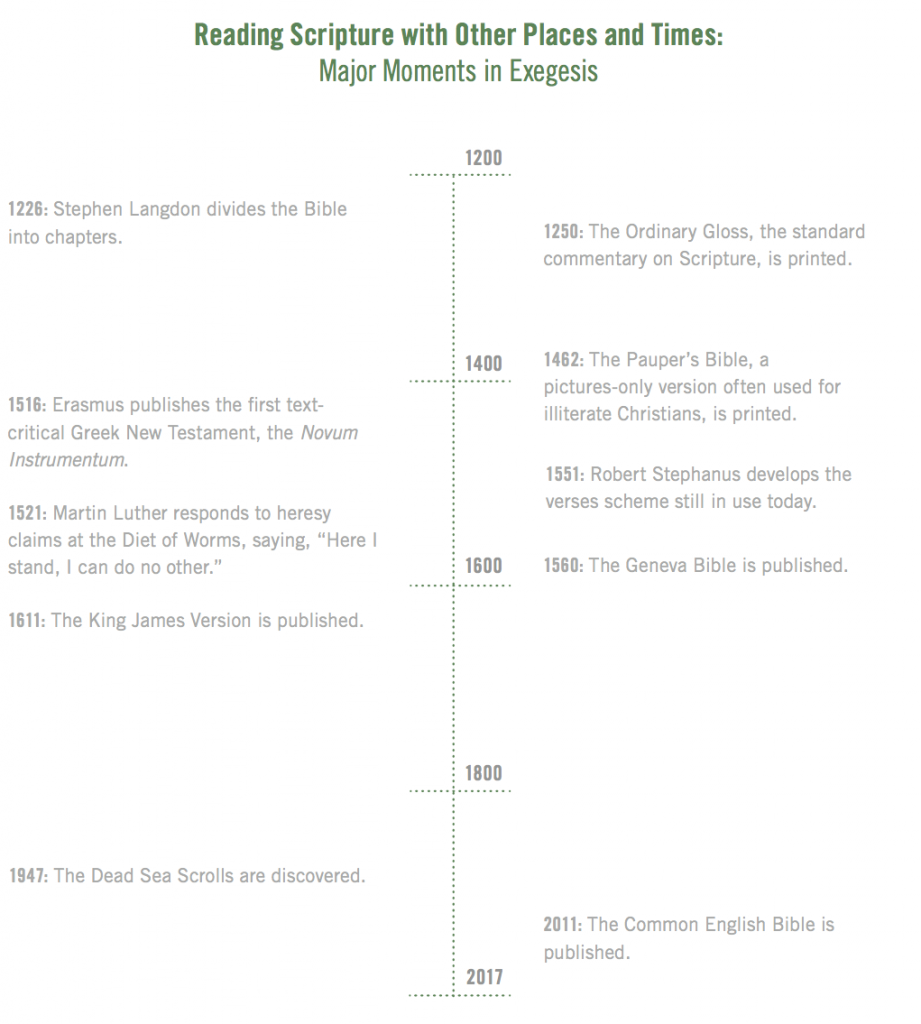
“The practice of reading Scripture is not about learning how to mold the biblical message to contemporary lives and modern needs. Rather, the Scriptures yearn to reshape how we comprehend our lives and identify our greatest needs. We find in Scripture who we are and what we might become, so that we come to share its assessment of our situation, encounter its promise of restoration, and hear its challenge to serve God’s good news.”
+ Joel B. Green, provost and dean of the School of Theology, from his essay “Cultivating the Practice of Reading Scripture,” available for download here. Pictured: The Payton family Bible belonging to Grace Fuller, wife of Charles E. Fuller, the founder of Fuller Seminary—a reminder of Fuller’s historic and continual commitment to Scripture.
“What does it mean to give proper attention to the ancient Near Eastern nature of the Hebrew Scriptures? Minimally it means reading other ancient Near Eastern texts. The Scriptures are exceedingly ‘respiratory’: they breathe in the culture of their times, and breathe it back out in a different form. To the reader who learns to breathe the same air—the one who becomes familiar with the context—it is increasingly hard to believe that he or she once read the Bible without. Reading the Hebrew Scriptures in context is intoxicating, like breathing pure oxygen: everything is clearer and sharper, and the energy is immeasurably higher.”
+ Christopher B. Hays, D. Wilson Moore Associate Professor of Ancient Near Eastern Studies, in Hidden Riches: A Sourcebook for the Comparative Study of the Hebrew Bible and the Ancient Near East. Read more about Hays’s interpretations of ancient Near Eastern clay tablets in Voices on Technology.
![]() “A commentary is a seasoned work of a lot of reflection and teaching. . . . What it tries to do is to give my under- standing of the gospel as I read it and as the words run—the way the narrative goes—what is this gospel about? What is it bearing witness to?”
“A commentary is a seasoned work of a lot of reflection and teaching. . . . What it tries to do is to give my under- standing of the gospel as I read it and as the words run—the way the narrative goes—what is this gospel about? What is it bearing witness to?”
+ Marianne Meye Thompson, George Eldon Ladd Professor of New Testament, from a lecture on her completed commentary on the gospel of John—available here.
“There is an undeniable strangeness about much traditional exegesis. Yet the more we ponder it and weigh the intentions of our predecessors, the more we may find that their strangeness is also strangely familiar. That strangeness may harbor surprises for us about the past, and it may offer unlooked-for readings of Scripture that draw us out of ourselves into other Christian minds and other epochs of Christian churches and Christian culture. We need such encounters and such conversations. We may return from the past unpersuaded, but we will not return unchanged.”
+ John L. Thompson, professor of historical theology and Gaylen and Susan Byker Professor of Reformed Theology, from his book Reading the Bible with the Dead.
Sola Scriptura

“A seminary education will teach us to attend to the context of 2,000 years ago, but there’s sometimes a danger in which an overemphasis on the context behind the text doesn’t allow us to appreciate the living and dynamic character of the text. There’s an immediacy in which the Bible stories are also maps for our stories. The Pentecostal testimony allows us to experience the living and dynamic character of the word of God as it addresses our existential conditions today that can only be complemented by an understanding which seminary gives us of the world behind the text.”
+ Amos Yong, director of the Center for Missiological Research, reorienting the study of scripture from a historical document to a dynamic encounter in the present. Watch his video interviews here.
“Every drop of scripture dilates the eyes of our hearts,
Exposing both healthy and sick parts.
So when we refuse to engage or let it transform our minds,
The only other option is to live life as though blind.
These written words are set apart from all others
Because they teach us how to be better neighbors & strangers,
leaders & followers, fathers & mothers.
It is scripture alone that makes the life of the faithful clearer,
It is scripture alone that guides the life of every believer.”
 + Jeanelle Austin (MDiv ’13), operations director for Fuller’s Pannell Center for African American Church Studies, and Phillip Allen Jr., pastor and poet, in an excerpt from their five-part spoken word piece commissioned for the Five Solas Project. Organized by the Brehm Center’s Fred Bock Institute of Music directed by Ed Willmington, this project, which celebrates the 500th anniversary of the Reformation, interprets the five commitments of the reformers (here, “sola scriptura”) through a variety of artistic forms.
+ Jeanelle Austin (MDiv ’13), operations director for Fuller’s Pannell Center for African American Church Studies, and Phillip Allen Jr., pastor and poet, in an excerpt from their five-part spoken word piece commissioned for the Five Solas Project. Organized by the Brehm Center’s Fred Bock Institute of Music directed by Ed Willmington, this project, which celebrates the 500th anniversary of the Reformation, interprets the five commitments of the reformers (here, “sola scriptura”) through a variety of artistic forms.
“Since all readings of Scripture employ theological assumptions about God and how we learn of his purposes, we should welcome the opportunity to explore and learn from theological options from other places and times. Since we all belong to a common body of Christ, we should welcome the opportunity to read Scripture with these other believers. This engaged and faithful reading of Scripture seems more attractive to non-Western Christians than the barren historical-critical method. It is a reading that both encourages spiritual formation and seeks to harvest the exegetical riches of the contemporary church and the church through the centuries.”
 + Oscar García-Johnson, associate dean for Centro Latino and associate professor of theology and Latino/a studies, in his book coauthored with William A. Dyrness, senior professor of theology and culture, Theology without Borders: An Introduction to Global Conversations. In his words above, García-Johnson expands the reading community into the global church—a space where the diversity of interpretations enriches a shared life of faith.
+ Oscar García-Johnson, associate dean for Centro Latino and associate professor of theology and Latino/a studies, in his book coauthored with William A. Dyrness, senior professor of theology and culture, Theology without Borders: An Introduction to Global Conversations. In his words above, García-Johnson expands the reading community into the global church—a space where the diversity of interpretations enriches a shared life of faith.
“The more we take on scripture, the more we take on the life of Christ, we remember who we are. I’m not just Scott. I’m Scott redeemed by Jesus Christ; Jesus is breathing his very breath of life into me—I’m a different person. That’s a challenge for all of us: to not let our eyes scrape across the pages but to drill down and to really memorize and learn passages of scriptures. When scripture comes to you because it’s been memorized, it’s powerful. But scripture has very little power in our lives to transform us and others if it’s not within us.”
+ Scott W. Sunquist, dean of the School of Intercultural Studies, reflecting on the role of memorization as he reads scripture in community. Watch more here.
Reading Scripture Together

“By gathering together as a community and reading Scripture together, people can go through the whole Bible in well under two years. It is my belief that the Communal Reading of Scripture project will help the church relearn how to feast on the Word communally, to be fed and nourished by the God who speaks to his children through the Word.”
+ Bill Hwang (pictured above at left), a trustee of Fuller Seminary, reflecting on the power of reading scripture in community. Hwang has partnered with Tod Bolsinger (at right), chief of Fuller’s Leadership Formation Platform, and FULLER studio to create the Communal Reading of Scripture project, Fuller’s new commitment to gather people from all over the world to hear the Scriptures together.
“Teaching Sunday school at my church pushes me to be in scripture, to read theology, and to keep thinking about my own vocation as a psychologist in relationship to those things. It puts me in conversation with people on a weekly basis around scripture—oftentimes people who disagree with me and who I disagree with. I’ve realized over time that it’s shaping in me the virtue of hospitality.”
+ Brad D. Strawn, Evelyn and Frank Freed Professor of the Integration of Psychology and Theology, reflecting on the role of community in shaping his engagement with scripture. Watch more here.
“The way the church lives out its corporate life in the world and the form that life takes constitute a hermeneutical activity—the people of God interpret Scripture by the way they shape their life together. In this sense, there is no timeless or universal essence the church must express; rather, under God it constitutes itself afresh in each generation—it must become, theologically, a real presence.”
+ William A. Dyrness, senior professor of theology and culture, from his book Poetic Theology: God and the Poetics of Everyday Life. Read an excerpt here. With help from John Thompson, professor of historical theology and Gaylen and Susan Byker Professor of Reformed Theology, the timeline below reflects important dates in the development of the English Bible. See the resource list for a list of Fuller faculty involved in Bible translations.

Resources
Biblical Theology: The God of the Christian Scriptures
John Goldingay (IVP Academic, 2016)
Reading Jesus’s Bible: How the New Testament Helps Us Understand the Old Testament
John Goldingay (Eerdmans, 2017)
Seized by Truth: Reading the Bible as Scripture
Joel B. Green (Wipf & Stock, 2004)
Hidden Riches: A Sourcebook for the Comparative Study of the Hebrew Bible and Ancient Near East
Christopher B. Hays (Westminster John Knox Press, 2014)
A Former Jew: Paul and the Dialectics of Race
Love Sechrest (Bloomsbury T&T Clark, 2010)
John: A Commentary (New Testament Library)
Marianne Meye Thompson (Westminster John Knox Press, 2015)
Reading the Bible with the Dead: What You Can Learn from the History of Exegesis that You Can’t Learn from Exegesis Alone
John Thompson (Eerdmans, 2007)
Through translations, writing, and editorial support, the following Fuller faculty have contributed to modern-day Bible translations.
Common English Bible:
J. Andrew Dearman
David J. Downs
John Goldingay
Joel B. Green
Christopher B. Hays Kyong-Jin Lee
Pamela J. Scalise
Love L. Sechrest Marianne Meye Thompson
New Living Translation:
Frederic W. Bush
David Allan Hubbard Donald Hagner
Robert Guelich
Marianne Meye Thompson
Available Classes
The Bible, Hermeneutics, and Christian Mission with Keon-Sang An
Experiencing the Land of the Bible with Christopher Hays and Marianne Meye Thompson
Interpretive Practices with John Goldingay
Introduction to Ancient Near Eastern History, Literature, and Culture with Christopher B. Hays
Missional Reading of the Bible with Kyunglan Suh
New Testament Exegesis with various faculty
New Testament in its Ancient Contexts with Marianne Meye Thompson
New Testament Introduction with various faculty
Old Testament Introduction with various faculty
Old Testament Ethics with John Goldingay
Old Testament Exegesis with various faculty
Old Testament Hermeneutics with John Goldingay
Preaching the Bible as Scripture with Michael Pasquarello
Race and Christian Identity in the New Testament with Love Sechrest
Reading the Bible Contextually with Keon-Sang An
Theologies of Exile in the Old Testament with Jeremy Smoak
Women in the Old Testament: Text and Context with Elizabeth Hayes
The post Voices on Scripture appeared first on Fuller Studio.